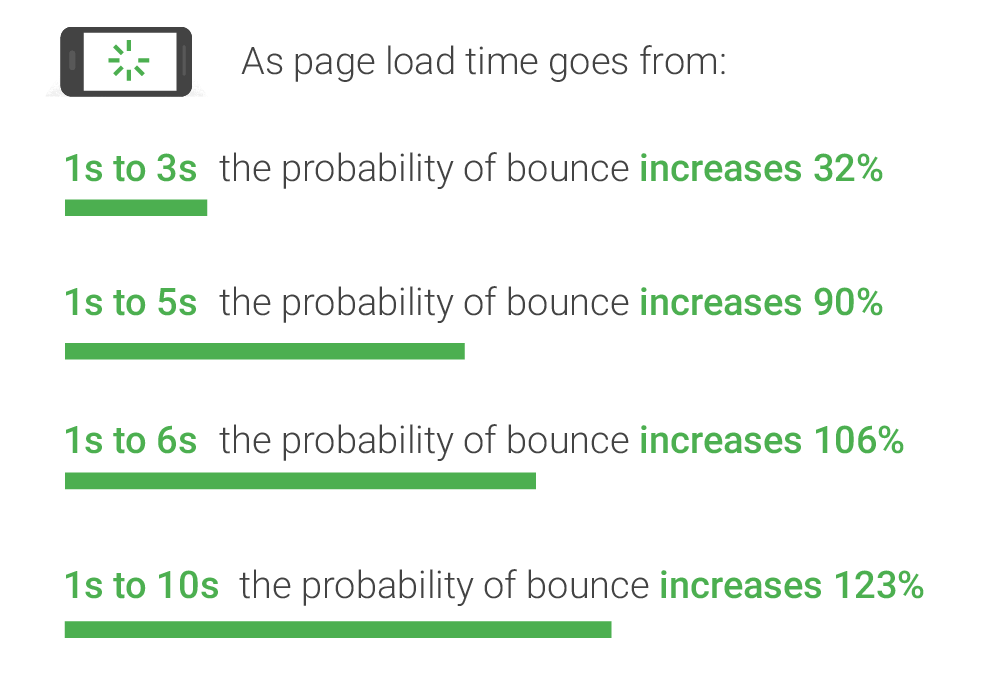What we do ...
We make your site faster, optimize it for mobile, and geo-tag your site for locations!
A study performed by Ericsson found that delays in loading a mobile website caused, on average, a 38 percent increase in heart rate, and an increased stress level roughly on par with watching a horror movie or answering math problems. We don't want to put anyone through that. Why Does Website Speed Matter? If concern about frustrating your users with a slow loading website isn't enough of a reason to improve speed, consider the fact that Google cares. A lot. Google acts upon what is intuitively obvious: A poor performing website results in a poor user experience, and sites with poor user experiences deserve less promotion in search results. As Internet connection speeds get faster, so too does the size of our web pages, as web developers push the envelope with more images, features, third party integrations, and code. Collectively, this means that despite advances in Internet speed many websites load slower today than ever. Page speed performance issues not only impact the satisfaction of your target users, but also the bottom line for your business. Slower sites hurt conversion rates. Consider the following research from Google on the impact of mobile page load times on bounce rates (users who leave your site after only viewing one page). As page load time increases, so do bounce rates: Measuring Page Speed with Performance Testing Tools Sometimes you just know that your site is slow and inefficient when it hangs, or you get complaints from staff or visitors on a routine basis. But if you're not sure where you stand, there are a number of free tools that make it easy to run a performance test to assess your website's speed.
Some of the more popular website performance assessment tools include:
Most of these tools will give you a performance "score" or "grade" along with tips for speed optimization on both desktop and mobile devices; they can be a practical way to get a sense of your site's performance, and to identify any low-hanging fruit that may help make your site faster.
However, you should also take these test results with a grain of salt, as automated tools are not perfect, and there are a number of variables and trade-offs that can impact your site's speed relative to design and functionality. If you don't really understand how to interpret these results in context you could find yourself making a lot of involved and costly site changes to improve an arbitrary score/grade, but with little impact on actual real-world performance or user experience.
If you're not sure how to interpret the results of your site's speed test, or would like some input on your site's performance, feel free to contact us and we'll be happy to conduct a complimentary review.
Does Your Site Need Speed? Making your website faster isn't about speed for speed sake - it's about making sure that your website is an effective business tool, while providing the best possible user experience for your site visitors.
Ultimately, a combination of objective testing along with professional assessment and guidance is the best approach to ensure you are making smart decisions that will result in optimal site performance. If you have questions about how to optimize your website's speed and performance while still maintaining your desired design and functionality, we're happy to help. Team Debello is well-versed in the best practices for website speed optimization discussed here, as well as other tricks, like caching, minification, and critical CSS, to make your site smaller, smarter, and faster. All you have to do is contact us, or use the form below to send an inquiry.
Measuring Page Speed with Performance Testing Tools Sometimes you just know that your site is slow and inefficient when it hangs, or you get complaints from staff or visitors on a routine basis. But if you're not sure where you stand, there are a number of free tools that make it easy to run a performance test to assess your website's speed.
Some of the more popular website performance assessment tools include:
Most of these tools will give you a performance "score" or "grade" along with tips for speed optimization on both desktop and mobile devices; they can be a practical way to get a sense of your site's performance, and to identify any low-hanging fruit that may help make your site faster.
However, you should also take these test results with a grain of salt, as automated tools are not perfect, and there are a number of variables and trade-offs that can impact your site's speed relative to design and functionality. If you don't really understand how to interpret these results in context you could find yourself making a lot of involved and costly site changes to improve an arbitrary score/grade, but with little impact on actual real-world performance or user experience.
If you're not sure how to interpret the results of your site's speed test, or would like some input on your site's performance, feel free to contact us and we'll be happy to conduct a complimentary review.
Does Your Site Need Speed? Making your website faster isn't about speed for speed sake - it's about making sure that your website is an effective business tool, while providing the best possible user experience for your site visitors.
Ultimately, a combination of objective testing along with professional assessment and guidance is the best approach to ensure you are making smart decisions that will result in optimal site performance. If you have questions about how to optimize your website's speed and performance while still maintaining your desired design and functionality, we're happy to help. Team Debello is well-versed in the best practices for website speed optimization discussed here, as well as other tricks, like caching, minification, and critical CSS, to make your site smaller, smarter, and faster. All you have to do is contact us, or use the form below to send an inquiry.
Team Debello - Questions Answered, Problems Solved!
We are going to provide you with actual and important information without spam.

